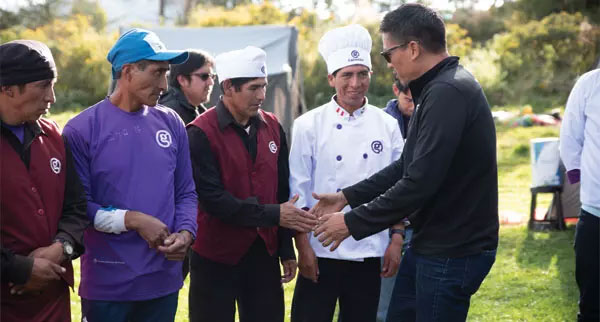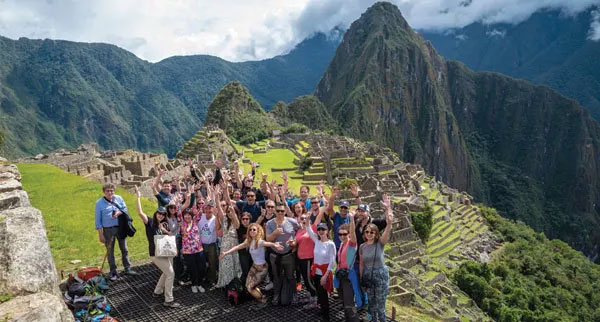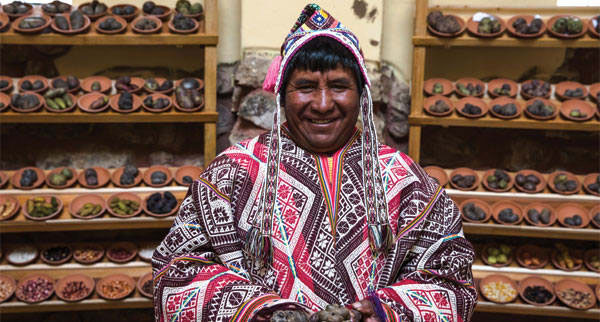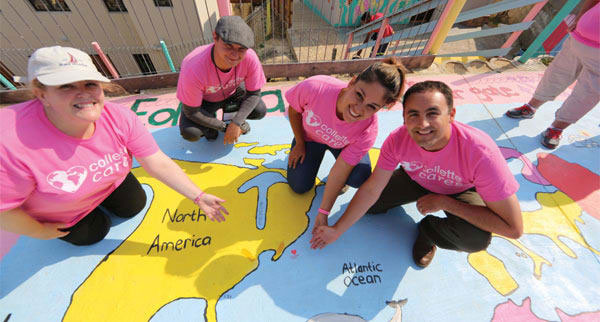Ella Buchan goes behind the scenes to see G Adventures’ sustainable projects in practice.
Click here to download and save as a PDF.
The mountains were still shrugging off a shroud of morning mist as we arrived at the Ccaccaccollo Women’s Weaving Co-op in the heart of Peru’s Sacred Valley.
A low hum of chatter, punctuated by occasional shrieks of laughter, vibrated from the women who spun wool under straw-thatched canopies and by trees. The scarlet and satsuma hues of their handwoven jackets and hats popped against the green-grey backdrop.
Nearby, a baby alpaca whined and performed a jig, shaking the bright pink pompoms looped around its ears.
Yet, at least for a moment, all eyes were fixed on one woman. Mercedes, a community leader at the cooperative, was explaining how working here had changed her life. And she was crying.
“If any of us had any doubts about the potential of travel and tourism to engender positive change, they were quickly dispersed.”
“The community wasn’t like this 15 years ago,” she told us. “Our houses were just made of straw. Now we can invest money in education for our children and improving our homes. We can invest in what we need, to grow as human beings.”
Her voice cracking, she added: “It feels like, since tourists came here, our lives are changing.”
If any of us had any doubts about the potential of travel and tourism to engender positive change, they were quickly dispersed by this living, breathing evidence.

The good life
We were on a behind-the-scenes tour with G Adventures. Dubbed ‘G for Good’ and hosted by company founder Bruce Poon Tip, we visited projects and initiatives supported and/or funded by the adventure travel company.
And Mercedes’ emotional speech wasn’t a one-off. We were frequently greeted with choreographed dance performances, Poon Tip was bestowed with handmade gifts as a thank you for bringing tourism to communities that were previously overlooked and, occasionally, we witnessed grown men and women burst into tears.
Yet, for Poon Tip, it isn’t about charity. He isn’t trying to be a hero or to patronise these communities. He’s running a business, and he wants to do it in a sustainable and responsible way.
“It’s about developing a strategy within a region to develop social community projects that interact with our trips,” he explains.
“On Caye Caulker in Belize, profits from Bike with Purpose are funnelled into educational programmes, benefiting the students who run the tours.”
The weaving cooperative was G Adventures’ first social enterprise, founded by its non-profit arm, the Planeterra Foundation, in 2005. Since then, 53 projects across 34 countries have followed the same model of providing value to tourists while benefiting communities.
In Vietnam’s Hoi An, for example, Oodles of Noodles helps at-risk youths develop cooking and English-language skills, and provides travellers with a good meal. On Caye Caulker in Belize, profits from Bike with Purpose are funnelled into educational programmes, benefiting the students who run the tours. And in New Delhi, all-female taxi service Women on Wheels is one of many projects aimed at empowering women.
At the Ccaccaccollo cooperative, tourists are given a fascinating introduction to ancient Andean techniques. Each item is painstakingly spun with llama and alpaca wool, and even the brightest colours are extracted from plants.
The 60 women who make up the cooperative get to make a decent living while keeping ancient techniques alive. Many of them have husbands and male relatives working for G Adventures as cooks and porters on the Inca Trail.

High times
The next morning, we took a train ride past pistachio-coloured mountains, gorges and ravines crossed by skinny bridges. Portions of the hillsides were etched with terraces, a landscaping technique that allowed the Inca people to plant on steep slopes.
The scenery was beautiful but only a hint of what we could expect when, after a bus journey from Aguas Calientes, we arrived at Machu Picchu. From the Andean peak it was built upon and the rows of sculpted terraces to the llamas grazing within a maze of dry-stone walls, it felt simultaneously familiar and weirdly, wonderfully alien.
“Portions of the hillsides were etched with terraces, a landscaping technique that allowed the Inca people to plant on steep slopes.”
As Peru’s most famous and most popular attraction, the ancient Incan citadel is also an example of why sustainable tourism is necessary. Visitor numbers are now restricted in an attempt to slow the erosion caused by heavy footfall.
It’s a delicate balance. The site needs to be protected, but tourism provides jobs.
We stopped for pizza at Hot Springs, a restaurant in Aguas Calientes. G Adventures brings its tour groups there for lunch and, in exchange, the owners provide porters and guides with food and a place to shower and rest between trips. It’s neither a Planeterra project nor an investment, but a neat example of the mutually beneficial relationships tourism can bring.

Self starters
Another is the G Values Fund, which provides low-interest loans and support to employees wishing to start their own business. Poon Tip realised that most tour guides – known as chief experience officers, or CEOs – can manage only a few years on the road before risking burn-out. The fund, founded in 2015, gives them an opportunity to create a business closer to home, drawing on their experience and skill-set.
Again, the litmus test is that each business can be incorporated into one of G Adventures’ trips.
Former chief experience officer Ruben Diaz was one of the first to seize the opportunity. Best Bite Peru runs food tours in Lima, visiting markets crammed with a head-spinning array of fruits and vegetables and offering cooking classes, teaching the secrets of Peruvian classics such as ceviche and pisco sours.
“We establish only businesses that are serving our business,” says Poon Tip, reiterating what he regards as the company’s point of difference. “We are not a charity. We are a for-profit business.”
He believes this pragmatic approach provides travellers with a “better experience”, introducing businesses run by those immersed in the brand.
“Part-funded by Planeterra, the project is dedicated to the preservation of potato seeds and Andean farming techniques.”
And it complements Planeterra’s non-profit projects and partnerships with local communities, allowing them to share their knowledge and provide rich travel experiences.
Bringing more tourists to particular attractions and areas also has a ripple effect. The popularity of the Parwa Community Restaurant, an hour from Cusco, for example, has spawned a new micro-industry of quail-egg farmers.
Back in the Sacred Valley, we took a tour of Parque de la Papa, or ‘Potato Park’. Part-funded by Planeterra, the project is dedicated to the preservation of potato seeds and Andean farming techniques. About 6,000 people from six Quechua villages work the land and conduct research.
Mariano Sota, one of the project’s founding members, showed us around an impressive library of root vegetables: there are roughly 1,400 indigenous varieties of potato on the site.
Sota plucked a puce-coloured specimen from a shelf and deftly sliced off the top, revealing vibrant cerise flesh.
It was a particularly pretty potato. Yet, seeing his grin as he angled it towards us, I suspected that Sota’s pride went beyond aesthetics.
That small and bumpy oval seemed symbolic of the Andean techniques and traditions being preserved thanks, at least in part, to projects such as Parque de la Papa.
It also represented a different model of tourism, with natural resources and communities sustained by visitors, rather than eroded by them.

Sample product
G Adventures’ Inca Discovery includes a four-day trek along the Inca Trail with porters directly employed by the company, and visits to projects including the Ccaccaccollo Women’s Weaving Co-op and the Parwa Community Restaurant in the Sacred Valley. The eight-day trip starts at £949, excluding flights, for November 2018 departures.
gadventures.com
Responsible tourism projects
Collette Cares was founded in 1997 and now operates children’s education and nutrition projects in Australia, Cambodia, Fiji, Kenya, Ecuador, Peru, Poland, Costa Rica, India and South Africa.
gocollette.com/collettecares
The TreadRight Foundation – a joint initiative by The Travel Corporation brands including Insight Vacations and Trafalgar – has supported more than 50 sustainable tourism projects preserving local heritage and providing clean water.
treadright.org
The Intrepid Foundation doubles every donation by guests of Intrepid Travel, and covers all administration costs. In total, nearly £4m has been donated to more than 100 community organisations since 2002.
theintrepidfoundation.org
The Saga Charitable Trust, set up in 1985, funds projects in 17 countries, from schools in Sri Lanka, Guatemala and South Africa to healthcare in India, kids’ swimming lessons in Vietnam and teaching sign language in Nepal.
saga.co.uk
Abercrombie & Kent Philanthropy supports 41 projects in 18 countries, including elephant and rhino conservation, providing bikes for small communities in Africa, and housing and education for pregnant women in Thailand.
abercrombiekent.co.uk
Exodus Travels works with UK charities that support international initiatives, including tiger conservation in India, education for Tanzanian porters, provision of clean water in Laos and meals for underprivileged kids in Ethiopia.
exodus.co.uk/responsible-travel
Read more
Places to go and things to see in Sao Paulo, Brazil
Adventure in lesser-known Guyana, South America
The best slow-paced escorted tours




